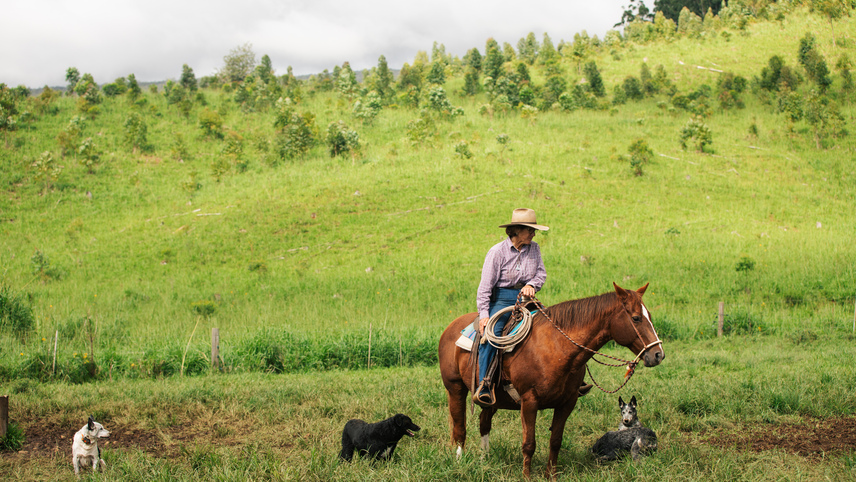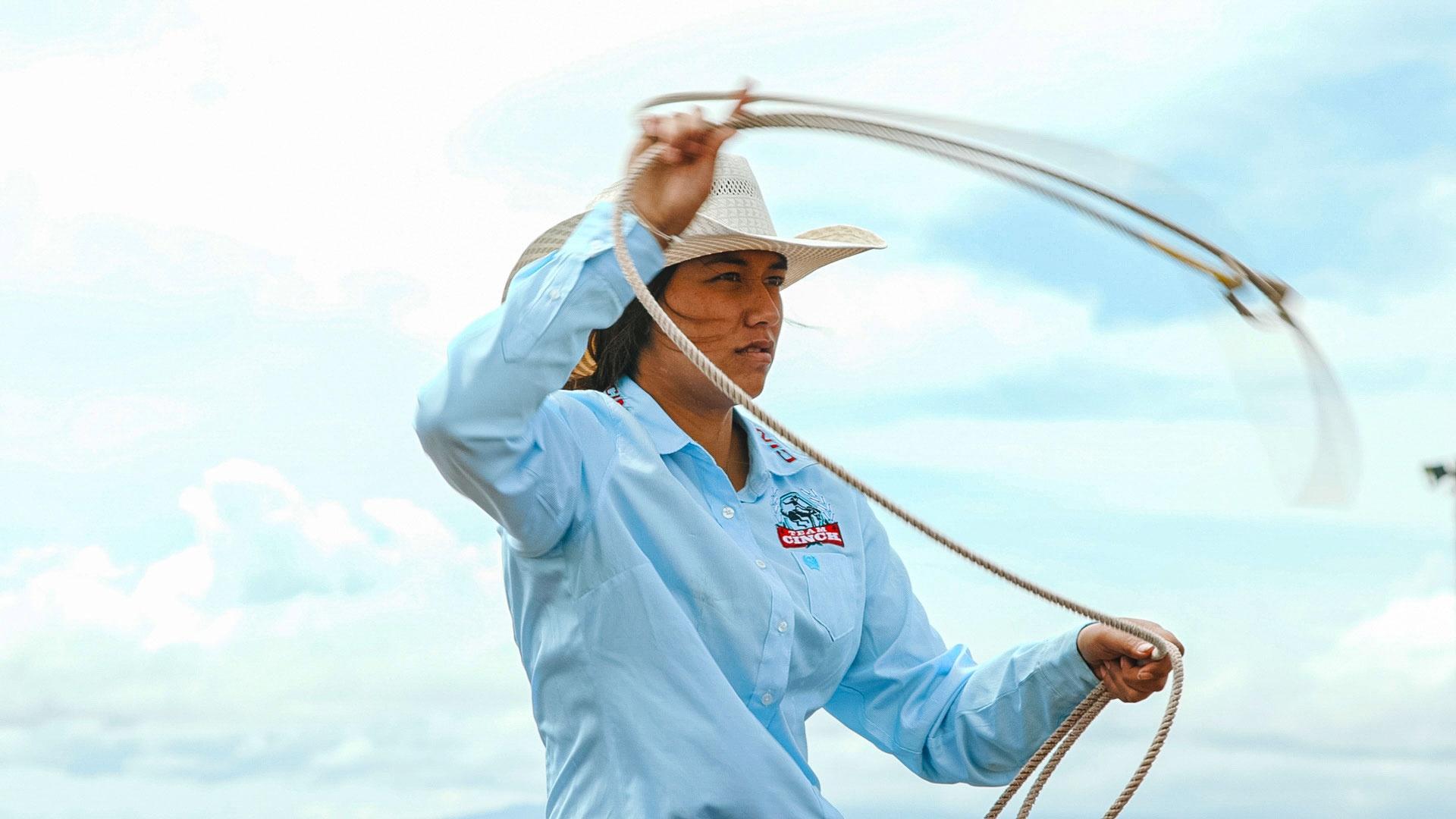Directed by Liz Barney and Alison Week, documentary feature ISLAND COWGIRLS brings viewers a unique look at the lives of two different paniolos, or Hawaiian cowgirls, on Hawai‘i Island.
They are each part of ranches on the island with longstanding family ties.
In the film, high school senior Laʻi Bertelmann wrestles with the decision of where her next path may lead. One possibility is heading to the mainland for college, which would also mean leaving her family and the ranch in Pu‘uanahulu. Her mother, DeeDee Keakealani Bertelmann, doesn’t want to steer her in any direction, but wants to see Laʻi make the decision for herself.
On another part of Big Island, Lani Cran Petrie calls out to direct cattle. Her husband checks the expanse of their Kapāpala Ranch by air, flying a small plane overhead. Petrie checks the rain gauge for Kaniwai (the sound of water), a water system they installed, which irrigates 34,000 acres of land by pipeline using gravity. It was also at great expense, a “million-dollar water system,” Lani says in one scene.

There is also a deep, cultural connection to the ‘aina, or land.
In one scene, multiple generations of the Keakealanis gather to build a stone wall, talking and laughing throughout, though it looks like nothing short of a laborious endeavor. It is an intimate moment, a family affair steeped in history, culture, legacy, and identity (they are seen building the wall without cement, an ancient method used by Native Hawaiians).
The moment also resonated with one of the filmmakers, Alison Week. “How much language and culture and knowledge was imparted by Papa Sonny [DeeDee’s father] and how much fun these girls were having after such a long day, the way that family dynamics are in play stepping up to perpetuate the culture, you get to witness that a little bit,” said Week in a phone interview with the filmmakers.
Co-director Liz Barney, who has also observed different approaches to land in Hawai‘i, noted the significance of the inherent connection and generational expertise. “When you’re trying to apply a top down solution without taking into consideration the voices of the communities that so intimately know this land and have lived there for generations, you’re losing a lot of that knowledge, that connection to the land,” she said.
The livelihood of the family ranches documented in the film, however, stand in precarity due to the uncertainty of their land leases. The Keakealanis are on a month-to-month lease; the lease for Kapāpala Ranch is set to expire in 2029.
The precarity is a result of an archaic system, including newer land laws conflicting with older ones, related licenses that were issued before Hawai‘i achieved statehood, and a number of other factors which would go beyond the scope of this piece. However, a stark contrast emerges between how land is currently managed between departments and remains at the forefront of the issue.
Under Hawai‘i’s Department of Land and Natural Resources (DLNR), which is managing their leases, at the termination of the lease, the land and any assets belong to the state. “They appraise the property, come up with a fair market rent, and put it to public auction,” Petrie explained in a conversation by phone on October 28.
Owners would have to outbid others to buy their property back, including any improvements made to the land – which means there is no incentive to do so.
It stands in striking contrast to how land is managed under the Department of Agriculture. After using agricultural value to appraise the land, the current expired lessee would receive the first right of refusal.
“That’s a huge, huge, thing right there,” said Petrie. “You’re inspired to keep taking care of the land, and all the improvements and all the assets. Where, under the DLNR, you’re bound to lose them.”
There is much at stake; the land is remarkably more than just a piece of property.
Both families are excellent stewards of the land, caring for it and making improvements. The land is deeply connected to Native Hawaiian identity and culture. It helps instill deep cultural values in the next generation and is part of a legacy. Petrie’s great-grandfather was a foreman in the 1880s; the land in DeeDee’s family goes back for at least 15 generations.
But things are looking hopeful, with a noteworthy update to the film’s narrative: the status of their leases may be on track to be transferred.
At a meeting last August, the Board of Land and Natural Resources voted unanimously to transfer the Kapāpala properties to the Department of Agriculture. The future of the Keakealani properties remains uncertain at this time.
What’s next for the immediate future? “The governor has to sign an executive order,” said Petrie.
There is considerable concern surrounding the executive order, which also lacks transparency in the process: the DLNR is responsible for writing it, but the same agency was responsible for rent increases in the past, as much as tenfold in 2014, Petrie acknowledged.
She hopes to see what was agreed to at the land board meeting come to fruition.
 Melissa Kim is a writer, journalist, and media consultant. Her work has highlighted independent films, Korean talent, and Asian American artists at SXSW, Sundance, Tribeca, and the Hawai’i International Film Festival. Her articles have been published in NBC News, Character Media, Koreanfilm.org, and Mochi Magazine. She also co-produces Kdrama Reports, a podcast covering Korean content. Melissa’s experience in the media industry has led her to many different roles, from organizing open call auditions and directing a short film to working in international television distribution and assisting at MIPCOM. Melissa was also part of the Start-Up Writers Team for “Two Scoops Funny,” a show featuring original comedy sketches at last year’s Hawaii Comedy Festival. Melissa has an M.A. in Asian Studies; her graduate research has examined South Korea’s independent film movement and the impact of Korean television dramas on the American distribution market.
Melissa Kim is a writer, journalist, and media consultant. Her work has highlighted independent films, Korean talent, and Asian American artists at SXSW, Sundance, Tribeca, and the Hawai’i International Film Festival. Her articles have been published in NBC News, Character Media, Koreanfilm.org, and Mochi Magazine. She also co-produces Kdrama Reports, a podcast covering Korean content. Melissa’s experience in the media industry has led her to many different roles, from organizing open call auditions and directing a short film to working in international television distribution and assisting at MIPCOM. Melissa was also part of the Start-Up Writers Team for “Two Scoops Funny,” a show featuring original comedy sketches at last year’s Hawaii Comedy Festival. Melissa has an M.A. in Asian Studies; her graduate research has examined South Korea’s independent film movement and the impact of Korean television dramas on the American distribution market.
The HIFF ONLINE CREATIVES & CRITICS IMMERSIVE (HOCCI) program supports sustainable film criticism in Hawai‘i through mentorship and paid career opportunities. The mission of HOCCI is to broaden diversity in film criticism across the Pacific region and use influencer branding strategies to spark career opportunities in Hawai’i, not be hampered by oceans, state borders and distance, because geography is no longer a barrier. The 2023 HOCCI is supported by Critical Minded, a grant-making and learning initiative that supports cultural critics of color in the United States.



